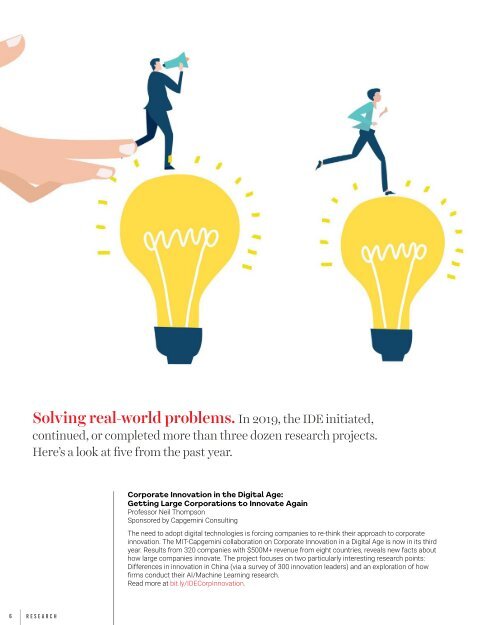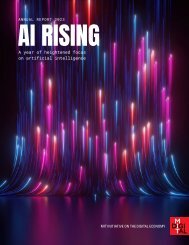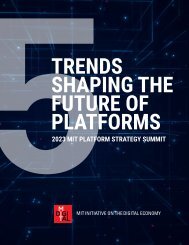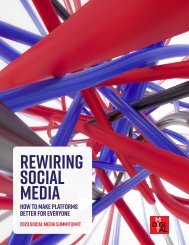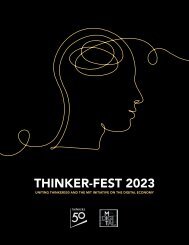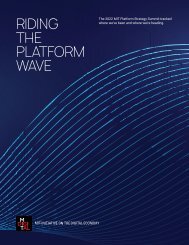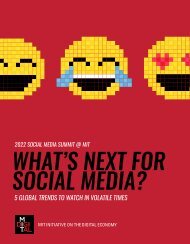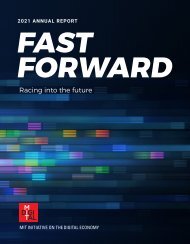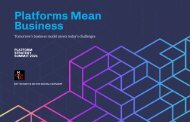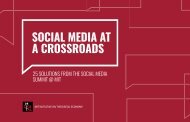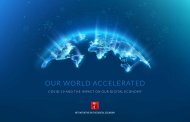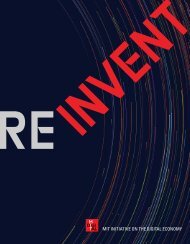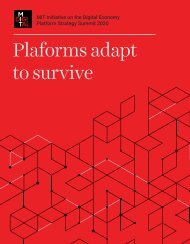2019 MIT IDE Annual Report
Create successful ePaper yourself
Turn your PDF publications into a flip-book with our unique Google optimized e-Paper software.
Solving real-world problems. In <strong>2019</strong>, the <strong>IDE</strong> initiated,<br />
continued, or completed more than three dozen research projects.<br />
Here’s a look at five from the past year.<br />
Corporate Innovation in the Digital Age:<br />
Getting Large Corporations to Innovate Again<br />
Professor Neil Thompson<br />
Sponsored by Capgemini Consulting<br />
The need to adopt digital technologies is forcing companies to re-think their approach to corporate<br />
innovation. The <strong>MIT</strong>-Capgemini collaboration on Corporate Innovation in a Digital Age is now in its third<br />
year. Results from 320 companies with $500M+ revenue from eight countries, reveals new facts about<br />
how large companies innovate. The project focuses on two particularly interesting research points:<br />
Differences in innovation in China (via a survey of 300 innovation leaders) and an exploration of how<br />
firms conduct their AI/Machine Learning research.<br />
Read more at bit.ly/<strong>IDE</strong>CorpInnovation.<br />
Automation and New Tasks:<br />
How Technology Displaces<br />
and Reinstates Labor<br />
Daron Acemoglu<br />
Pascual Restrepo<br />
Supported by Google.org<br />
For centuries, wage and employment<br />
growth remained unaffected by<br />
automation since it was accompanied<br />
by new technologies that maintained<br />
the role of human labor in value<br />
creation. But in the era of AI, it’s up<br />
to policymakers to ensure that the<br />
pattern continues. This research<br />
project presents a framework for<br />
understanding the confounding<br />
effects of automation and other<br />
types of technological changes on<br />
labor demand. It can help to interpret<br />
changes in U.S. employment over<br />
the recent past.<br />
Read more at bit.ly/techdisplacement.<br />
Accounting for the Value<br />
of New and Free Goods in<br />
the Digital Economy Shows<br />
Surprising Results<br />
Erik Brynjolfsson<br />
W. Erwin Diewert<br />
Avinash Collis<br />
Felix Eggers<br />
Kevin J. Fox<br />
How much are online services<br />
actually worth to consumers? That<br />
provocative question was one impetus<br />
for this groundbreaking research.<br />
Specifically, the welfare contributions<br />
of the digital economy, characterized<br />
by the proliferation of new and free<br />
goods, were not being adequately<br />
measured. The introduction of a totally<br />
new metric, GDP-B, quantifies digital<br />
benefits, rather than costs. When<br />
applied to several empirical examples—<br />
including Facebook and smartphone<br />
cameras—their valuations could<br />
be estimated more accurately. For<br />
example, including the welfare gains<br />
from Facebook would have added<br />
between 0.05 and 0.11 percentage<br />
points to U.S. GDP-B annual growth.<br />
Restated, Facebook is worth about $40<br />
to $50 per month for U.S. consumers,<br />
according to the surveys<br />
Read more at bit.ly/GDP-B.<br />
Data Strategy for<br />
Financial Services AI<br />
in a Platform World<br />
Geoffrey Parker<br />
Joshua Creamer<br />
Shivaji Dasgupta<br />
Sophie-Louise Baratta<br />
Sponsored by Deutsche Bank<br />
Despite great interest in the socalled<br />
“FinTech” market, platform<br />
change has been slow to infiltrate<br />
the retail and commercial banking<br />
sector. Banks worldwide are only<br />
now experiencing the opportunity<br />
and risk from platforms, and one<br />
of the central challenges will be<br />
platform governance. This project,<br />
in collaboration with Deutsche Bank,<br />
examines strategies and models for<br />
data governance and monetization.<br />
The research will focus on the<br />
exploration of data strategies for<br />
companies that have built large<br />
platforms; monetization of<br />
platform business models for<br />
financial services, and governance<br />
models and regulation.<br />
Building a Productive<br />
Workforce: The Role of<br />
Structured Management<br />
Daniela Scur<br />
What distinguishes productive workers?<br />
<strong>IDE</strong> Postdoctoral Associate Daniela<br />
Scur and her co-authors show how<br />
firms with structured management<br />
are better at hiring, firing, and retaining<br />
workers. Labor market models often<br />
overlook specialized investments in<br />
managerial processes or managerial<br />
talent. The Brazilian dataset used here<br />
uniquely allowed the researchers to<br />
observe the occupation of workers, as<br />
well as the reason for their separation<br />
from the job.<br />
Read more at bit.ly/ProdWorkforce.<br />
Follow <strong>MIT</strong> <strong>IDE</strong> on Medium<br />
for fresh insights on the<br />
digital economy.<br />
LEARN MORE ABOUT OUR RESEArCH AT <strong>IDE</strong>.<strong>MIT</strong>.EDU<br />
<strong>IDE</strong> Research Pillars<br />
Productivity,<br />
Employment,<br />
and Inequality<br />
How can we accelerate the<br />
transformation of institutions,<br />
organizations, and human skills to keep<br />
up with digital innovation?<br />
Led by Erik Brynjolfsson<br />
New Digital<br />
Business<br />
Models<br />
How can entrepreneurs more quickly<br />
implement new digital business models<br />
in ways that create widespread benefits<br />
for all?<br />
Led by Andrew McAfee<br />
Social Analytics<br />
and Digital<br />
Experimentation<br />
How do new technologies and new<br />
means of social interaction impact<br />
productivity, consumer demand, political<br />
mobilization, and public health?<br />
Led by Sinan Aral<br />
Big Data and<br />
Information<br />
Privacy<br />
How can we harness the remarkably<br />
fine-grained, real-time data now<br />
available to answer age-old questions<br />
and identify new opportunities?<br />
Led by Alex “Sandy” Pentland<br />
6 RESEARCH<br />
7


